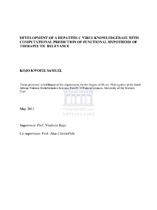| dc.description.abstract | To ameliorate Hepatitis C Virus (HCV) therapeutic and diagnostic challenges requires robust intervention strategies, including approaches that leverage the plethora of rich data published in biomedical literature to gain greater understanding of HCV pathobiological mechanisms. The multitudes of metadata originating from HCV clinical trials as well as low and high-throughput experiments embedded in text corpora can be mined as data sources for the implementation of HCV-specific resources. HCV-customized resources may support the generation of worthy and testable hypothesis and reveal potential research clues to augment the pursuit of efficient diagnostic biomarkers and therapeutic targets. This research thesis report the development of two freely available HCV-specific web-based resources: (i) Dragon Exploratory System on Hepatitis C Virus (DESHCV) accessible via http://apps.sanbi.ac.za/DESHCV/ or http://cbrc.kaust.edu.sa/deshcv/ and (ii) Hepatitis C Virus Protein Interaction Database (HCVpro) accessible via http://apps.sanbi.ac.za/hcvpro/ or http://cbrc.kaust.edu.sa/hcvpro/. DESHCV is a text mining system implemented using named concept recognition and cooccurrence based approaches to computationally analyze about 32, 000 HCV related abstracts obtained from PubMed. As part of DESHCV development, the pre-constructed dictionaries of the Dragon Exploratory System (DES) were enriched with HCV biomedical concepts, including HCV proteins, name variants and symbols to enable HCV knowledge specific exploration. The DESHCV query inputs consist of user-defined keywords, phrases and concepts. DESHCV is therefore an information extraction tool that enables users to computationally generate association between concepts and support the prediction of potential hypothesis with diagnostic and therapeutic relevance. Additionally, users can retrieve a list of abstracts containing tagged concepts that can be used to overcome the herculean task of manual biocuration. DESHCV has been used to simulate previously reported thalidomide-chronic hepatitis C hypothesis and also to model a potentially novel thalidomide-amantadine hypothesis. HCVpro is a relational knowledgebase dedicated to housing experimentally detected HCV-HCV and HCV-human protein interaction information obtained from other databases and curated from biomedical journal articles. Additionally, the database contains consolidated biological information consisting of hepatocellular carcinoma (HCC) related genes, comprehensive reviews on HCV biology and drug development, functional genomics and molecular biology data, and cross-referenced links to canonical pathways and other essential biomedical databases. Users can retrieve enriched information including interaction metadata from HCVpro by using protein identifiers, gene chromosomal locations, experiment types used in detecting the interactions, PubMed IDs of journal articles reporting the interactions, annotated protein interaction IDs from external databases, and via “string searches”. The utility of HCVpro has been demonstrated by harnessing integrated data to suggest putative baseline clues that seem to support current diagnostic exploratory efforts directed towards vimentin. Furthermore, eight genes comprising of ACLY, AZGP1, DDX3X, FGG, H19, SIAH1, SERPING1 and THBS1 have been recommended for possible investigation to evaluate their diagnostic potential. The data archived in HCVpro can be utilized to support protein-protein interaction network-based candidate HCC gene prioritization for possible validation by experimental biologists. | en_US |

